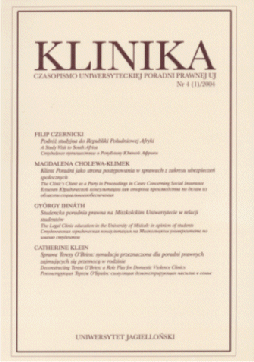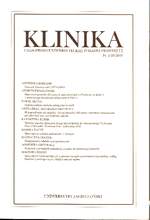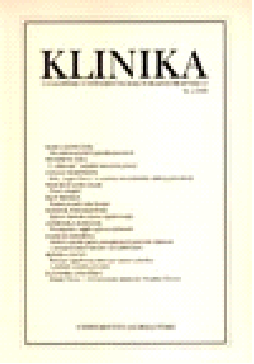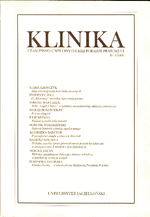'Klinika' Journal. POLISH LEGAL CLINICS JOURNAL
One of the important aspect of supporting the legal clinics is to enhance a debate on the methods and challanges of clinical education. Therefore, the Foundation regularly publishes a "The Clinic" magazine. Below, we present selected issues that Polish clinical students found particularly interesting.
1/ Active teaching methods
One of the characteristic features of Clinical Legal Education distinguishing it from other activities which are taught at law schools, is the usage of active teaching methods. They are used by academics, who are both supervisors within legal clinics and academics teaching regular classes. Clinical supervisors broaden the scope of active teaching methods, enriching them with new ideas. One of the ideas used by some legal clinics in Poland, is an introduction of audio-visual techniques as an active teaching methods, when working in legal clinics. The new teaching method is based on the recording of situational scenes, cases or simulated mock trials and moot courts, which are, after their technical development, the basis for conducting classes for the selected topic which corresponds with the theme of the film.
2/ Internship in Babsea
An Author as the first Polish law student participated at the Legal Studies Internship 2009, which was organized by the human rights non-governmental organization the Bridges Across Borders South East Asia in Thailand.
The Author prepared and taught workshops at the Juvenile Detention Center every week and awaken prisoners that although they are in a closed area, they are still human beings and have the same human rights as every person has. Besides the volunteering, during the internship, many meetings were organized with the interns, eg. the workshop with Malaysian students to discuss about the controversial topics related with law. The Author, after the end of the program, works in the Law Clinic at university and joined to the student's program "Street Law" to prepare absolutely new workshops about human rights, which are presented to pupils at schools.
3/ Section for the disciplinary affairs of students.
The article presents conducts of disciplinary proceedings in student's cases, legal basic, structure and functioning of new section, exemplary cases tried by the section of disciplinary affairs of students, showing positive aspects of this activity.
The section for the disciplinary affairs of students acts in the Student Law Office at the Faculty of Law and Administration at the University of Silesia.
The disciplinary responsibility of students called the quasi- penal responsibility of students is regulated in chapter 6 of the act from 27.07.2005- the Act of Higher Education and the rules laid down for implementation: disciplinary procedure for the students is regulated by the Ministry of Science and Higher Education from 6.12.2006.
Disciplinary proceeding commission rules about responsibility of the defendant. Appealing disciplinary proceedings commission serves students as a higher instance.
The student can be brought to justice in a disciplinary case through violation of university's law and acts against the dignity of the student.
Fraud, manhandling, punishable threat, battery, affray, theft can be the acts leading to expulsion from university. In these cases the defence is compulsory. If a student doesn't have a defender chosen by the themselves, the presiding judge appoints a student- defender ex officio from the section of the disciplinary affairs of students.
4/ Taking digital pictures and scanning files
The main issue is the lack of regulation of clinical students' rights to study court files and to copy them in various ways. Criminal Procedure Code regulates only the party's rights to investigate the court files and clinic clinical students are not considered as the litigants. This situation forces us to make use of the temporary solution based on article 156 § 1 of the Criminal Procedure Code which provides a possibility to file a motion to the President of the Court. After the President's consent is granted, students can study and copy court files. The ways of reproducing the files are not regulated in detail in the Criminal Procedure Code. In the author's opinion every copying technology is permitted, besides those, which can destroy files. Specifically, taking digital pictures and scanning files is permitted. Presented theory is confronted with the court's practice in Cracow based on the Department of Justice's circular letter.
5/ Issue how to evaluate the experience of working in a clinic can influence the future professional life of its members.
Most of the students have various expectations - some of them hope that clinic will help them to choose area of law to specialise in, others want to gain necessary skills and experience for future work. The article presents three stories of former members of the Warsaw University Legal Clinics . Although, they decided to choose different paths of carrier - one of them is currently engaged in social work, the other one is employed in one of the biggest law firm in Warsaw and the last one works at the Polish Constitutional Tribunal - they all unanimously stress that "the adventure with clinic" was the best experience they had during studies. Due to clinical experience they learned how to apply legal regulations in practice and how to perceive real people and their tragedies beyond paragraphs. They also mentioned that thanks to the tutors they had worked with, their point of view about many topics has changed. All of them truly enjoyed clinical semminars and at the end, they all admitted, that in their opinion joining the clinic should be obligatory for all the law students at Warsaw University. The article also aims to show how one person (in this case a tutor from the clinic) can influence life of a single student by helping him to see and choose the best path of carrier according to his interests.
6/ Recruitment process
The most important issue is to highlight the features of an ideal member of the clinic. It could be done in many different ways - checking his/her previous university records (the key ones, i.e. civil procedure, contract law, criminal law, etc.), other activities and last but not least - attitude towards charity work. Once there is a decision concerning the criteria, each clinic needs to choose the way of recruiting its members. It could include, depending on different matters, one, two or three stages. The interview itself should be conducted by at least two persons, including a person from the directors board and the clinical supervisor , in order to maintain the objectivity.
Needless to say, most of the candidates have not had any previous professional legal practice, but at least logical thinking and proper responding are required. Also, the individual approach is essential. It is very important to mix students at different levels of legal and social skills in order to provide them a challenging work environment. All the above mentioned issues, combined with a flexible approach towards the student, should guarantee a well organized and well functioning legal clinic.
Editorial office:
Fundacja Uniwersyteckich Poradni Prawnych
ul. Szpitalna 5 lok. 5
00-031 Warszawa
tel.: 22 829 91 29 w. 143
e-mail: This email address is being protected from spambots. You need JavaScript enabled to view it.
Publisher:
Wydawnictwo C.H. Beck Sp. z o.o.
ul. Bonifraterska 17 (budynek North Gate)
00-203 Warszaw
Archive issues with articles in English:
"Klinika" nr: 4 (1)/2004
The content of the issue is available by clicking on the cover (PDF file 8.6 MB).
"Klinika" nr: 3/2000
The content of the issue is available by clicking on the cover (PDF file 12 MB).
"Klinika" nr: 1 (2)/2000
The content of the issue is available by clicking on the cover (PDF file 16 MB).
"Klinika" nr: 1/2000
The content of the issue is available by clicking on the cover (PDF file 6.5 MB).









